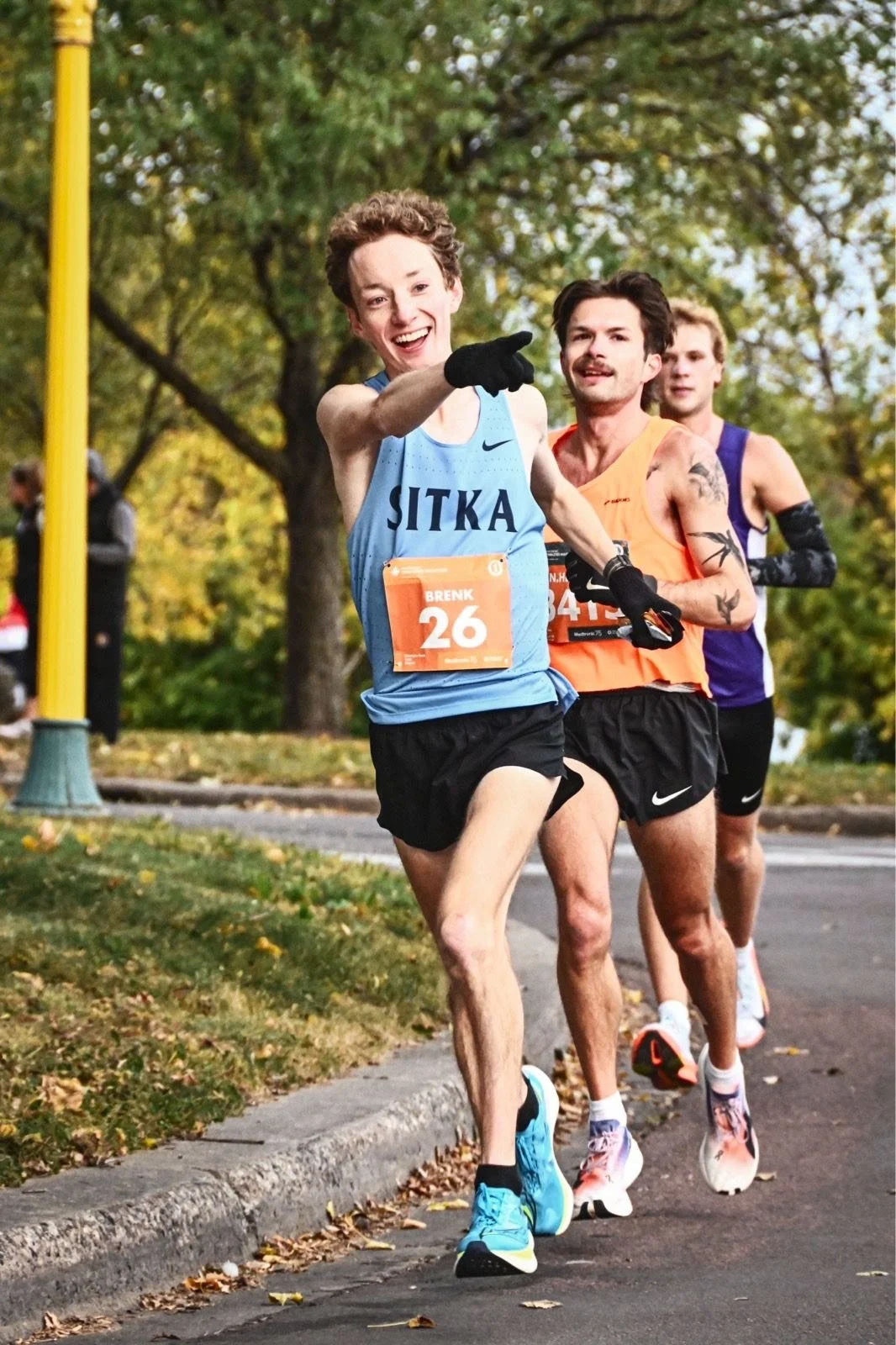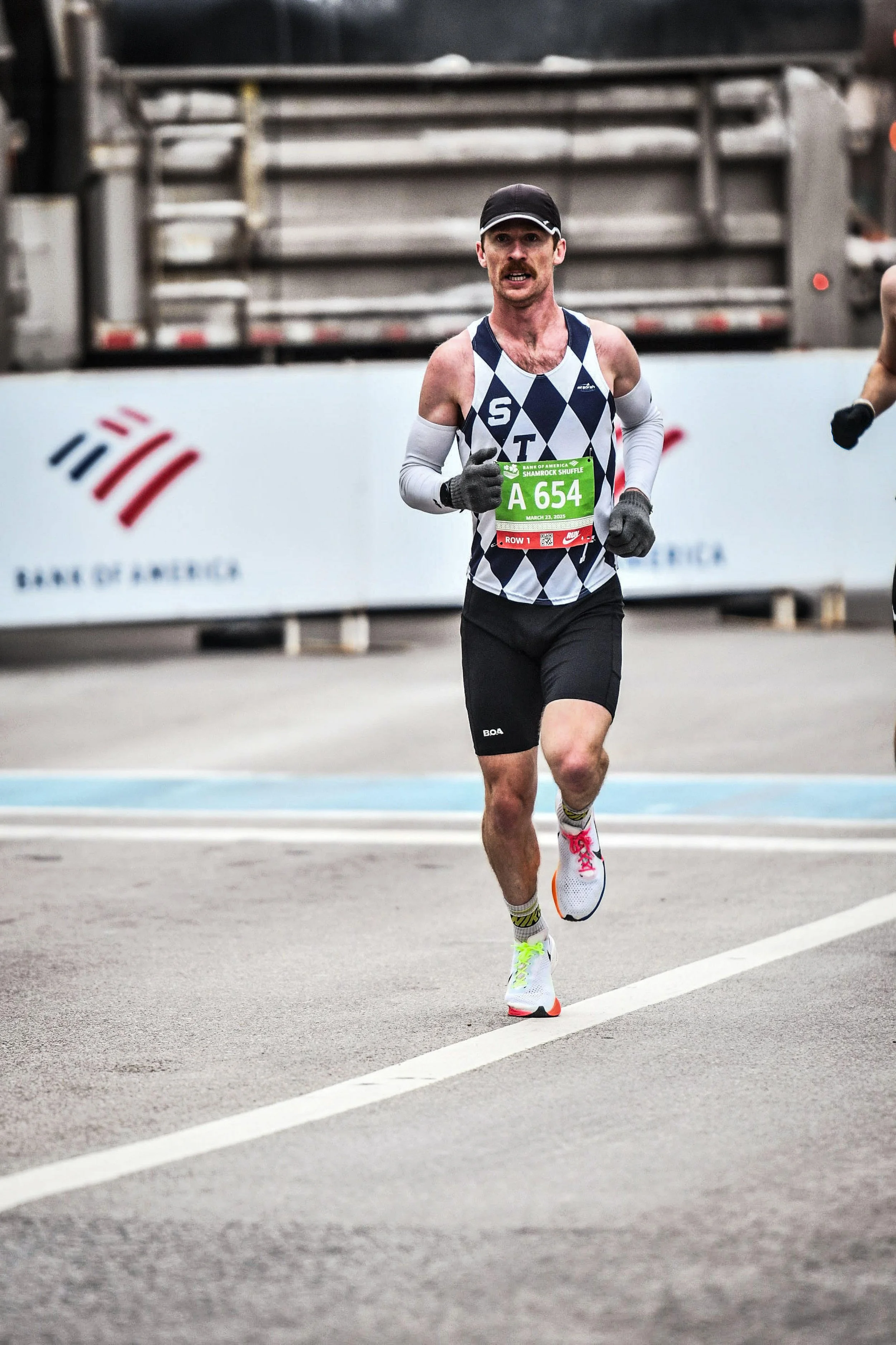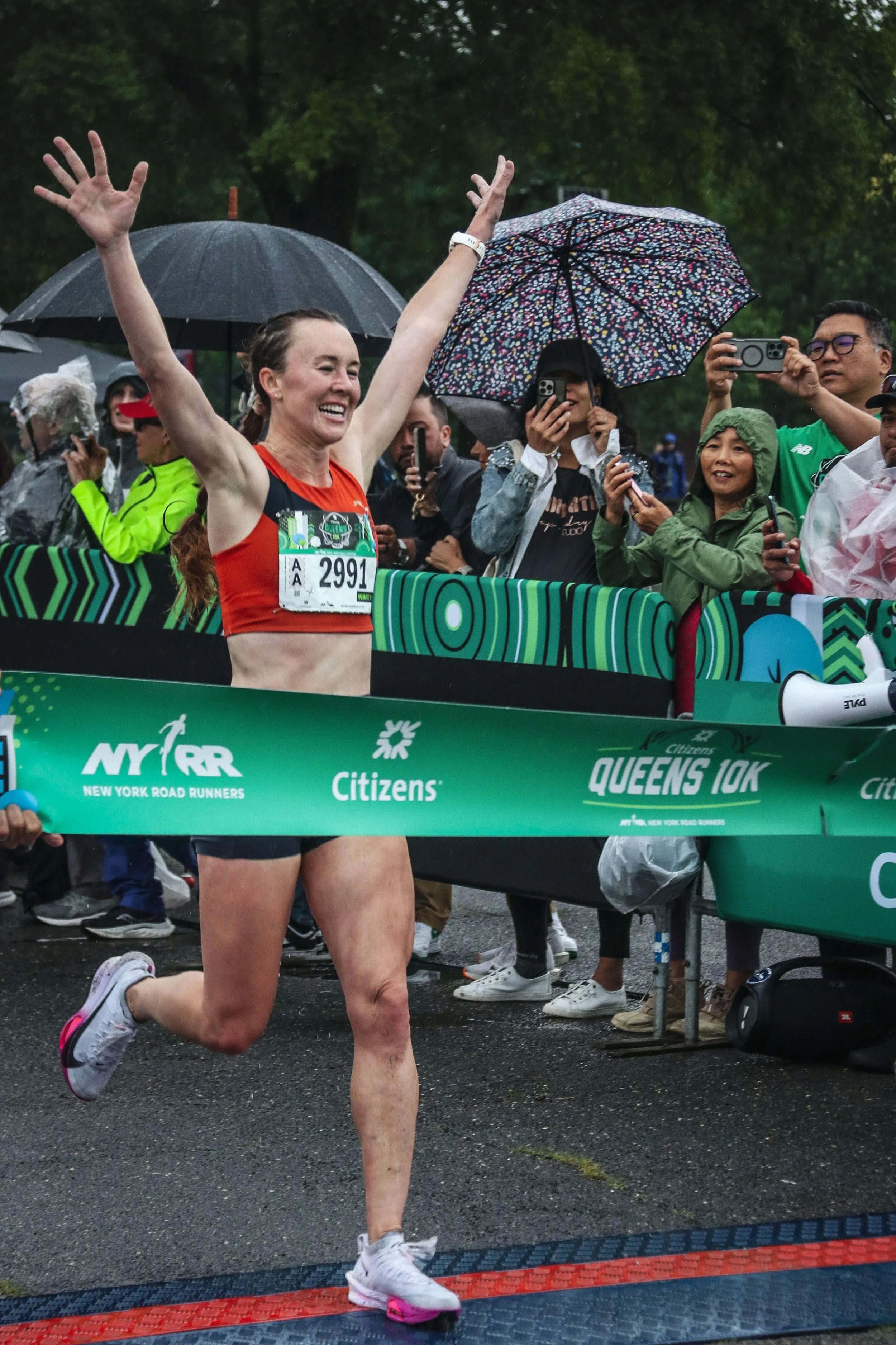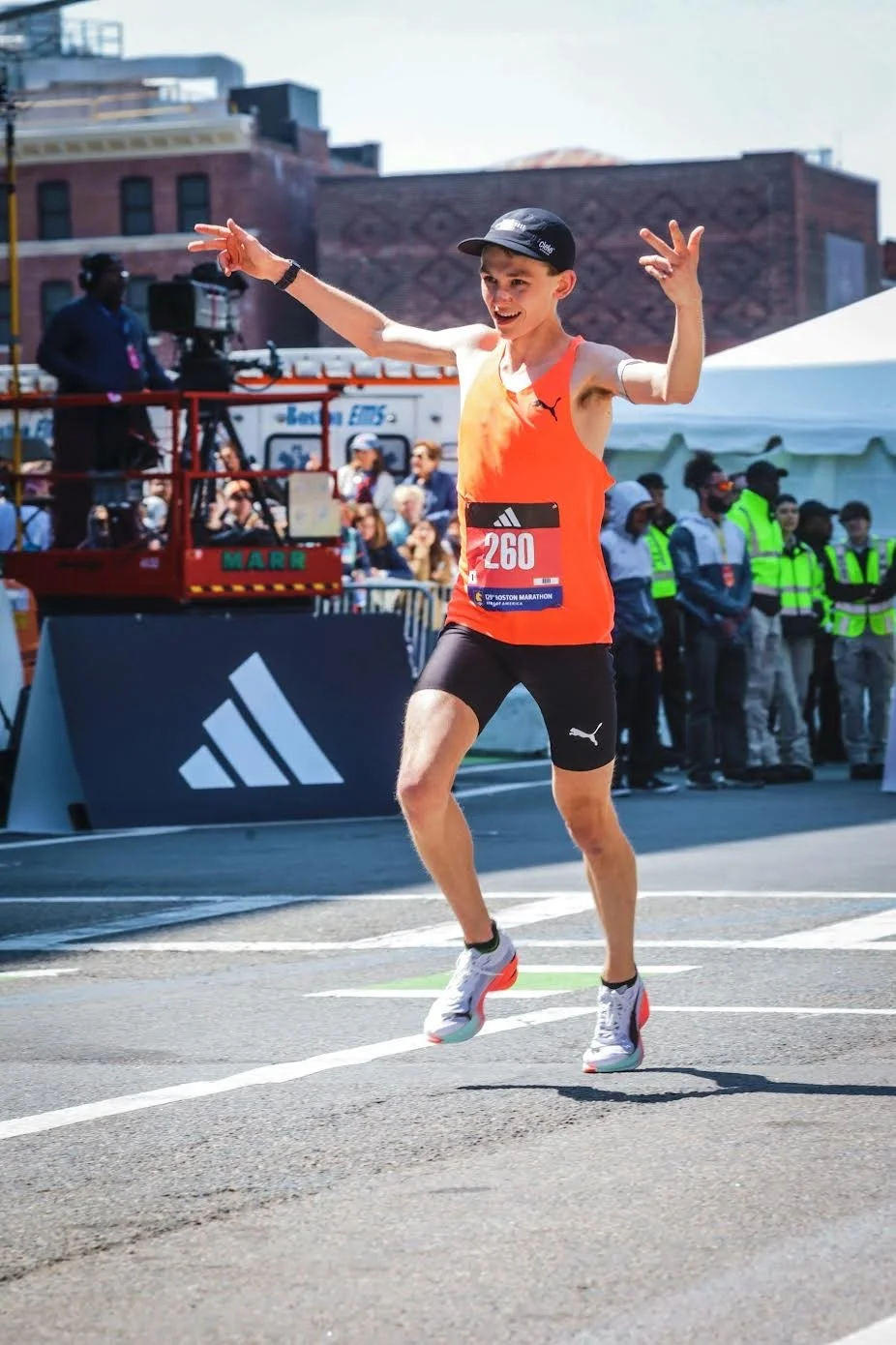Building for the fall: D3 Alumni Marathon Series
The sub-elite marathoner is hard to define. Cracking anything from a Boston Qualifier to an Olympic Trials Qualifier might entitle one to the definition–only 10% of the country’s marathon finishers achieve the former any given year, and the latter, something like 0.01%. It’s a rare thing. As a self-identified sub-elite D3 alum with a pile of excuses I still occasionally cite, my latest marathon of 2:22 puts me in the 99.9% of all finishers. Sure looks good on paper. But being 4–scratch that–6 minutes from a 2028 men’s OTQ, ostensibly, it’s still a world away. Yet here I am, working towards it. It has truly never occurred to me not to.
To ride the glory days and still chase the dream, uninhibited relative to the rest of daily life, demands a pretty good inherent “Why.” D3 alumni are particularly good at identifying theirs, because unlike their once financially incentivized D1 counterparts, they’ve never had to settle for an even more arbitrary rationale after the NCAA. (“You gone pro yet?” “No, Grandpa.” “Well why do you still run at five in the morning every day?”) The squad you trained with in college has by and large hung the shoes up. Life moves faster than you. Some are married, some have kids, and some, heaven forbid, were recently promoted at McKinsey or Epic. Old teammates now react to your pre-work double digit miles exactly how your coworkers do when dragged twice a week downtown to your hybrid job. The essence and spirit you exude is the real rarity. In a sport where we’ve all graduated from communal regiment, the Why for those of us still gunning for… whatever exactly it is we are gunning for, is important. There aren’t many runners left in this thin echelon of competitors, and D3 alumni hold a disproportionate amount of the representation.
By mile two of my last marathon, a pervasive silence descended, and it was already down to three of us. I certainly don’t mean we were leading. The two dozen professionals had long rocketed out of sight, some appropriately and some impetuously, chasing a payday. The other 99% of the field, meanwhile, were so far back that we couldn’t hear any steps–or sound at all–except our own. The commiserators in my group were Nick from Seattle and Josh from Minnesota, I learned. Formalities exchanged, goals shared. I knew someone on Nick’s club team. “You know (so and so)”? “Nope.” Bummer. Back to silence. For a moment, one could dispel the reality that we were on an exact predetermined course, stuck redlining until 26.2. It could just be, in fact, a sleepy Sunday morning stroll with new friends. Maybe that was the true nature of this. Occasionally, trees creaked in the October wind like haunted cheers. Smaller branches oscillated like waving hands.
The loneliness of the long distance runner is alive and well, and yet, a direct contradiction exists: role models are abundant among us. The best of us are still running before and sometimes also after a 9-5; if fortunate, once or twice a week linked with a good group of chums. Life outside training still features early bedtimes, run-centric vacations, and run-and-coffee dates. (“Have you always been this Type A?”) Idiosyncrasies aside, it's clear who these people are in your community, as they carry themselves the most authentically and without any need to elaborate. You can see it trailing behind them in the breeze and with a smile. They run in technicolor. What fuels it now, this pursuit to still get better? Community? Lingering competitiveness? The ethereal “for fun and personal bests” Al Carius philosophy? Does it need to be consciously pinned down? Fruitless in monetary gains and ubiquitously fatiguing, the ambition to still train hard and crush a PR is as spirited as it is beguiling. Every runner past their glory days will one day reconcile with stopping. So why isn’t it today? Maybe the answer drifts on the air of these pleasantly cooler late summer mornings: sunlight beams through the canopy of trees above. Birds chipper and chatter at your passing. Muscles loosen up. The gentle breeze feels cool on the skin. What’s not to like about this? Why stifle your own internal sense of the possibilities still at hand?
As the humidity soaks our clothes through in these late summer build months, I’ll be writing about D3 alumni who have inspired me and others with doing remarkable things and preparing for a fall moonshot. This week, a few of them were asked:
“Just why are you still running so much these days?”
Mike Friedman (UW-Stout 2020 / Next race: Twin Cities Marathon):
“Some days I ask myself the same question. I don't have to be trying to run at a high level anymore. I can just run easy, 3-4 times a week for my health but then I think ‘what else would I really want to do?’ I've been running since l've been 12 years old, why would I stop now? Part of me feels like I have something to prove to myself with my senior year getting cut short from Covid. I want to see if I can run faster than I did in college because I think I'm a bit more in tune with my body and the training it best responds to now. I want to keep training at a high level to see just how fast I can run. My mindset is: "why not try to get the best out of myself while I'm still relatively young"? You hear stories about guys qualifying for the Olympic Trials well into their 30s. That's motivating. Especially seeing that they're doing it balancing demanding work, quality time with their families/friends, and raising children. I may never qualify for the Olympic Trials or hit any of the goals that I set for myself, but I'd rather keep running at a high level and pursue those goals than give up on those dreams.”
Khia Kurtenbach (U. of Chicago 2018 / Next race: Chicago Marathon):
“Post-college, I was pretty sure I was done with competitive running. Then, I somehow got drawn into the amazing community of runners in NYC. Now, I'm still running competitively because training hard and racing is just so much fun. I'm not saying every day of training is amazing, but when I look at the years of running I've done post collegiately, there are just so, so many amazing memories of joy and silliness and triumph with wonderful people that I wouldn't have if I wasn't still training, chasing running goals, and racing. I'm still doing this to build more of those memories.
In the short-term, I'd like to qualify for the marathon Olympic trials (hopefully this fall). In the long-term, I hope I'm like my mom and still running marathons at 65. First and most importantly, I think the most important thing I get out of this is the community you build - when you chase really hard goals but do it with other people, you build really meaningful relationships. I'm so grateful for all of the friendships I've made post-college through running. Second though, I think there's also a lot of joy to be found in chasing hard goals, where there's such discrete measures of success and failure. When you're in school, you have that all the time with grades, but as an adult, even in a career, you don't have those same milestones of success in such a concrete way - there's something so satisfying and joyful when you work really hard towards a goal (sometimes for a really long time) and then finally clearly succeed at it. Then it's just even better when you have a big community around you that you chased that goal with.
Sam Forstner (Ripon 2024 / Next race: Chicago Marathon):
“That's certainly a multi-faceted question. Although far away goals that never once seemed imaginable (such as chasing an OTQ, gaining sponsorships or placing amongst the professionals in a world major marathon) are quite alluring to pursue, I believe there is a deeper merit behind why I choose to run so much. To me, the biggest draw is to continue to develop and strengthen my own lifestyle centered around a running structure. By putting myself in positions that necessitate getting uncomfortable virtually on a daily basis, challenging myself with rigorous schedules and workouts, it has translated into an overwhelming success across all areas of my personal life. I gladly reap the benefits of a better physical and sociological health as a result. I believe there is no greater mood booster than seeing continual growth in oneself, particularly when the growth stems from an area that required greater cultivation to reach a satisfactory level of achievement. As someone who began running with a quite modest base, along with family and coaches who had little to no knowledge of distance running training, it always amazes me to reflect on the journey of where we once started. From a kid who earned the nickname "Meatbrick", to never qualifying at the state/national level throughout high school and college, it is quite astonishing to be able to still have a chance for rapid growth later on through the avenue of road racing. If anything, it is simply enjoyable to push the body to its limits to see what it can handle sometimes.”



